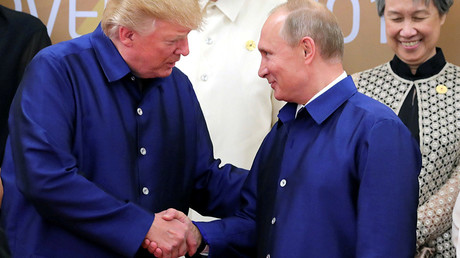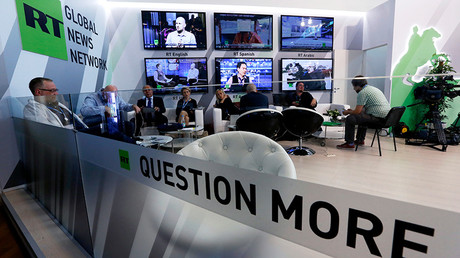'Putin Now Realizes Trump's Hands are Tied' - Think Tank Fellow
The
Russian president devoted considerable attention to Russian-US
relations during the course of his regular year-end press conference.
George Szamuely, a senior fellow at London Metropolitan University's
Global Policy Institute, told Sputnik the three important things he took
away from Putin's remarks.
Putin's
press conference took place Thursday, with Russian and foreign
journalists asking the president dozens of questions about Moscow's
foreign and domestic policy, including Putin's views on the state
of Russian-US relations.
Sputnik: Vladimir Putin said during his press conference
Donald Trump is unable to do as he pleases, whether it comes to amending
relations with Russia, or his other pre-election pledges, because he is
being controlled by the FBI. What do you make of this?
Szamuely: Putin realizes that Trump, and not only
during the campaign, promised that he would devote himself to improving
relations with Russia. Putin thinks that this is indeed what Trump wants
to do. This wasn't simply rhetoric during the campaign, but something
that reveals Trump's true intent. Trump just hasn't been able to do it.
And he hasn't been able to do it largely because of the fictitious hoax
of the Trump-Russia collusion stories. Any attempt by Trump
toward improving relations with Russia is immediately greeted with cries
of 'Ah this proves that there was collusion between Trump and the
Russians!', and 'Trump is clearly an agent of the Russian president.'
Putin realizes that Trump's hands are now tied. It is significant
that however much Putin criticizes [US policy], he has never blamed
Trump himself for any of this, [whether it be] the sanctions passed
by Congress, or the US government seizure of [Russian] diplomatic
compounds.
Sputnik: Putin also pledged that Russia will not participate
in any global arms race, informing journalists about Russia's $46
billion in defense spending, compared with the $700+ billion that the
Pentagon is currently spending. What's your feeling with regard to that?
The figures seem quite stacked.
Szamuely: That's exactly right, and despite those
figures, if you come to the United States, you would think that the
Russians were spending like mad and threatening the United States. In
fact it's completely the opposite, and this is why US policy has been so
dangerous. The US has massively increased defense spending, and Trump
signed his new Defense Authorization Act, which is a huge increase
in spending just from last year.
When you combine that with the belligerent rhetoric toward Russia
that emanates from Washington, there's good reason for the Russians
to be nervous about US intentions.
The other thing is, Putin reminded the audience that the United
States withdrew from the ABM Treaty some years ago, and that now it has
effectively withdrawn from the INF Treaty, [the other of] the two key
pillars of the arms control regime of the Cold War. Putin says that
Russia has no intention of withdrawing from the INF Treaty, but of
course if the United States continues with this policy of essentially
just tearing up the INF Treaty, the Russians will have to respond.
And he said that the next to fall could be the START Treaty. Putin
did express some alarm that these arms control agreements are just going
into the wastepaper basket.
Sputnik: On Syria, Putin again warned against the US and the
West against cooperation with rebel militants, saying that using them
in the fight against Damascus was a dangerous policy. What is your take
on the Syrian situation?
Szamuely: It was remarkable what he said about US
attitudes toward terrorists. He reminded the audience that when the US
sponsored the Mujahedeen in Afghanistan in the 1980s, it came back and
hit the Americans on 9/11. This is what happens when you do these
short-term opportunistic things of supporting terrorists for your own
short-term ends. And he said this is what being done in Syria – that
they are refusing to do anything toward ISIS [Daesh] because they still
want to use ISIS and Al-Qaeda for their own short-term ends of hurting
Assad. So yes, this was a remarkable thing – that for all their talk
of the US global war on terror, this is far from the case. The United
States does use these terrorists for its short-term ends. Even now it's
doing exactly that.
The views and opinions expressed by George Szamuely are those of the expert and do not necessarily reflect those of Sputnik. © Sputnik/ Michael KlimentyevThe Russian president devoted considerable attention to Russian-US relations during the course of his regular year-end press conference. George Szamuely, a senior fellow at London Metropolitan University's Global Policy Institute, told Sputnik the three important things he took away from Putin's remarks.Putin's press conference took place Thursday, with Russian and foreign journalists asking the president dozens of questions about Moscow's foreign and domestic policy, including Putin's views on the state of Russian-US relations.
© Sputnik/ Michael KlimentyevThe Russian president devoted considerable attention to Russian-US relations during the course of his regular year-end press conference. George Szamuely, a senior fellow at London Metropolitan University's Global Policy Institute, told Sputnik the three important things he took away from Putin's remarks.Putin's press conference took place Thursday, with Russian and foreign journalists asking the president dozens of questions about Moscow's foreign and domestic policy, including Putin's views on the state of Russian-US relations.

